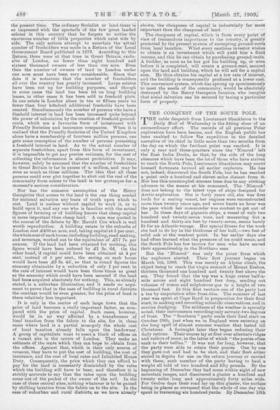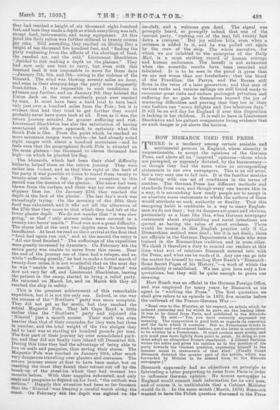THE CONQUEST OF THE SOUTH POLE.
THE cable despatch from Lieutenant Shackleton to the 'Daily Mail of Wednesday is the fitting close of an extraordinary effort. The records of all previous Polar exploration have been beaten, and the English 'public has been enabled to follow the expedition in' the detailed narrative of its chief in little more than two months from the day on which the furthest point was reached. It is only a year and three-quarters since the 'Nimrod.' left the East India Docks, so that, by the side of the long absences which have been the lot of those who have striven to reach the North.Pole, Lieutenant Shackleton may count himself fortunate beyond all earlier explorers. He has not, indeed, discovered the South Pole, but he has reached a point only a hundred and eleven miles distant from it. Nor has thiamnexainpletlAnceess been due,to any striking advance in the means at his command. The 'Nimrod does not belong to the latest type of ships designed for Arctic exploration. She is forty years old, she was first built for a sealing vessel, her engines were reconstructed. more than twenty years ago, and seven knots an hour wag the pace which her commander was content to get out of her. In these days of gigantic ships, a vessel of only two hundred and twenty-seven tons, and measuring but a hundred and thirty-six feet by twenty-seven, seems barely fit for an Atlantic voyage. Her special fitness for the work she had to do lay in the thickness of her hull,—two feet of solid oak at the weakest point. In her earlier days she had' often learned what the pressure of ice could mean, and the South Pole has few terrors for men 'who have served their apprenticeship in the Northern seas.
But the Nimrod ' was only the point from which the explorers started. Their first journey began on March 6th, 1908. This was merely an Alpine climb, the object being to reach the virgin summit of Mount Erebus, thirteen thousand one hundred and twenty feet above the sea. They found that the top was a huge crater'half mile' across and eight hundred feet deep, sending out volumes of steam and sulphurous gas to a height of two thousand•feet. In this first venture one of the party lost a toe by amputation after frost-bite. The summer of last year was spent at Cape Royd in preparation for their final start, in making and recording scientific observations, and in marine dredging. The mildness of the weather is specially noted, their instruments recording only seventy-two degrees of frost. The "Southern" party made their final start on October 29th, just when we in England were enteriu0. on the long spell of almost summer weather that lasted till Christmas. A fortnight later they began reducing their daily rations. Their course lay at first over alternate ridges and valleys of snow, in the latter of which "the ponies often sank to their bellies." It was not for long, however, that the party were able to retain their ponies. One by one they gave out and had to be shot, and their flesh either stored in depots for use on the return journey or carried with them, each member of the party having to haul 'a weight all told of two hundred and fifty pounds. By the beginning of December they had come within sight of new mountain ranges, and discovered a glacier a hundred and twenty miles long and. approximately forty miles wid'e. For twelve days their road lay up this glacier, the surface being in.places so crevassed that the whole of one day was spent in traversing six hundred yards. By December 18th they had reached a height of .six thousand eight hundred feet, and here they made a, depot at which everything was left, except food, instruments, and camp equipment. At this point the 'daily ration was further reduced to twenty ounces per man. Still ascending, they reached on Boxing Day a beight of ten thousand five hundred feet, and "finding the 'Arty weakening from the effects of the shortage of food, the rarefied air, and the cold," Lieutenant Shackleton " decided to risk making a depOt on the plateau." They had now only one tent to carry, but even with this lessened load it was impossible to move for three days —January 7th, 8th, and 9th—owing to the violence of the blizzard. The wind was blowing seventy miles an. hour, and even in their sleeping-bags, the party were frequently frost-bitten. It was impossible in such conditions to advance any further, and on January 9th they hoisted the Union Jack on the most southerly point ever reached by man. It must have been a hard trial to turn back Only just over a hundred miles from the Pole ; but 'it is evident that had they tried to get further they would probably never have come back at all. Even as it was, the return journey entailed far greater suffering and risk. Lieutenant Shackleton has also the satisfaction of having ascertained with shine approach to certainty what the South Pole is like. From the point which he reached no more mountain ranges were visible—he had already noted eight ranges with about a hundred mountains—and he feels sure that the geographical South Pole is situated on the same plateau—ten thousand to eleven thousand feet high—on which he planted his flag. • • The blizzards, which had been their chief difficulty hitherto, helped them on the return journey. They were rather less violent, and as they blew right at the back of the party it was possible at times to travel from twenty to twenty-nine miles a day.: The great exception to this record was the. descent of the glacier. The snow had been blown from the surface, and ,their way lay .over sheets of slippery blue ice. On January 27th they reached the -depot at the foot of the glacier. The last day's work was exceedingly trying. On the morning of the 26th their food was exhausted and it wtts not till the afternoon of the 27th that they came to that which they had left at the lower glacier depot. We do not wonder that "it was slow going," or that "only sixteen miles were covered in a twenty-two hours' march." Food was now a great difficulty. The stores left at the next two depots seem to have been insufficient. At least we read on their arrival at the first that ." food had again run out," and at the second the entry is "All our food finished." The sufferings of the expedition were greatly increased by. dysentery. On February 4th the entire party was unable to move from this cause. Near the end of the journey one of them had a relapse, and as, while "suffering greatly," he had to make a forced march of twenty-four miles, it is not wonderful that on the next day he was "unable to march." Happily the ' Nimrod ' was now not very far off, and Lieutenant Shackleton, leaving the patient in the camp, started to bring a relief party. He returned on March 1st, and on March 4th they all reached the ship in safety.
This is the greatest achievement of this remarkable expedition, but it is not the only one. Indeed, in one way the success of the "Northern" party was more complete. They did not get so far south, but they reached the actual Magnetic Pole. They left Cape Royd a little earlier than the "Southern" party and rejoined the ' Nimrod ' just a month sooner. Their work was even heavier than that of their comrades, for they were but three in number, and the total weight of the two sledges they had to haul was at starting six hundred pounds per man. The first part of their journey lay over consolidated pack- ice, and they did not finally turn inland till December 6th. During this time they had the advantage of being able to live on seals and penguins, thus saving their stores. The Magnetic 'Pole was reached on January 16th, after much very dangerous travelling over glaciers and crevasses. The return journey seems at first to have been easier, but on reaching the coast they found their retreat cut off by the break-up of •the sheet-ice which they had crossed two months before. With their supplies exhausted, and only Bids and penguins to depend on for food, "the outlook was serious." Happily this situation had been so far foreseen that the ' Nimrod was keeping a careful watch along the • COast.• On February 4th the depfit was sighted on the ice-cleft, . and a welcome .gun fired. The signal was promptly heard, so promptly indeed that one of the rescued party, "rushing out of the tent, fell twenty feet down a crevasse." But joy seldom kills, even when a crevasse is added to it, and he was pulled out again by the crew of the ship. The whole narrative, for which we are indebted to the enterprise of the Daily Mail, is a most striking record of human courage and human endurance. The .benefit is not exhausted when the scientific results have been recorded and tabulated. It is to be seen in the proof it gives that we are not worse than our forefathers ; that the blood of the Franklins, the Parrys, and the Rosses still flows in the veins of a later generation; and that men of various ranks and various callings are still found ready to encounter great risks and endure prolonged privation. and suffering for no gain to themselves beyond the joy of mastering difficulties and proving that they too in their own fashion can "scorn delights and live laborious days." It will be an evil day for Eugland if over this disposition is lacking in her children. It is well to have in Lieutenant Shackleton and his gallant companions living evidence that no such danger is yet above the horizon.











































 Previous page
Previous page